


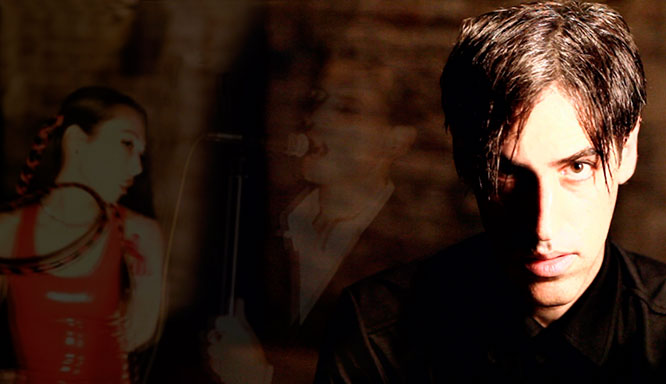
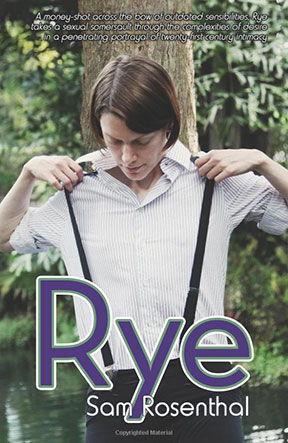
Sam Rosenthal is an American artist, musician and novelist. He is the founder and leader of the band Black Tape For a Blue Girl, and the Projekt Records music label. He currently lives in Portland, Oregon, with his son and cat. At least that's what it reads on his Wikipedia page.
Sam has produced some of the most compelling alternative music over the last three decades. Although not as well known as some labels, the Projekt label has consistently produced and released some of the best dark wave and gothic music around.
While Sam is busy running the Projekt label (and raising his son), he still finds time to create new work. He recently wrote the book, Rye, an erotic novel,
and is planning on continuing the story in a follow-up book. We sat down with Sam on his recent visit to Los Angeles, and talked about his career.
THE INTERVIEW
The Writing Disorder: So you are the founder/owner of Projekt?
Sam Rosenthal: Yes, I started it when I was in the crib, back in 1983.
The Writing Disorder: How did you begin the Projekt label, and your band, Black Tape for a Blue Girl?
Sam Rosenthal: I published a music fanzine in Florida from around 1981 to 1986, and sometime around 1983 I put out a cassette of some of the bands I was writing about. It was a compilation of mostly experimental and electronic bands. Also, there was some pop and ambient. I went around to local record stores and left them on consignment; people who were reading about the bands also wanted to hear the music. I had one piece on there that was electronic music; keyboards, with no vocals. And then I started putting out my own cassettes. I think the name Projekt was used on the second or third release. It wasn’t really a label yet, just something affiliated with my fanzine.
In ’86 I moved to California to attend college in Orange County. Up until that point, I only had one cassette release with any vocals on it. When I got out to California, I was mopey and depressed. I was a typical ’80s Morrissey, Cure fan. The first Black Tape for a Blue Girl album, The Rope, had one side that was all vocals and one side that was all instrumentals. It was a progression from the cassettes. I also stopped doing the fanzine once I moved out here. I started doing the label as a hobby on the side. Besides cassettes, I put out the first two Black Tape records on vinyl as well as cassette — the first in 1986 and the second in 1987. I was also in touch with a band from England, Attrition. I was talking with Martin, the vocalist and leader of the band. And after the 3rd Black Tape album (the first on CD in 1989), I put out an Attrition Best of CD. I also put out another compilation CD. So by 1990 there were four CDs. But it was all kind of a hobby still. I got a job doing computer graphics that paid a lot of money. I could afford to work with bands and put out their CDs. And back then it was expensive to make CDs. It cost about $6,000 to make a thousand! I had to work really hard to save up the money. That job funded the label.
The Writing Disorder: You worked as a graphic designer then?
Sam Rosenthal: Yes.
The Writing Disorder: Did people understand what you were doing?
Sam Rosenthal: I went to distributors with The Rope, and they were kind of, “Ugh, what do we do with this? Its kind of weird.” That sort of reinforced that I really didn’t want anyone else’s opinion, I just wanted to create the music I was interested in. I think that helped me be more adamant about doing my own label. And as Projekt grew, it became possible to take on other bands as well. Lycia was the first original band that had an album on the Projekt label. The Attrition CD was material from previous releases on other labels.
The Writing Disorder: How did you meet Mike VanPortfleet of Lycia?
Sam Rosenthal: I think Black Tape got some reviews in music magazines, or I put out an ad somewhere, and Mike wrote me and started sending me cassettes of his music. And that was the material that eventually was released (non-sequentially) as The Wake album. He did all this work on that music, but wasn’t satisfied, so he went on to write new songs, which was the Ionia album, which was their first release on Projekt. The Projekt label was able to do the same thing for other bands that it did for Black Tape for a Blue Girl. After Ionia, I released Love Spirals Downwards, Love Lies Crushing and Soul Whirling Somewhere, which came out really quickly after Lycia. And it was sort of fun to put out bands that no one had ever heard of at the time. I kind of just discovered music and put it out. Love Spirals Downwards was from Los Angeles, but the other bands were all from Arizona. So Projekt became known as this Southwestern music label. That brings us up to about 1993 or ’94.
The Writing Disorder: And you did the graphic design for the albums?
Sam Rosenthal: For Lycia and Soul Whirling Somewhere, I did the design and my girlfriend at the time — Susan Jennings — did the cover photographs. Love Lies Crushing had their own graphics, so I sort of formatted it. And Love Spirals Downwards, they had their own graphics as well. And that’s sort of the way it is now. I have the artists supply the photos and I do the design. I don’t really have the time to take photos too. At the time people really loved the 4AD look, but I tried to have a unique look and style for each band. I tried to give each band its own distinctive look. That’s probably the most fun aspect of running a label: working with bands and designing the covers. Projekt has 300 releases, I’ve designed a lot of covers. There are very few albums that came with their own finished artwork all ready for a cover.
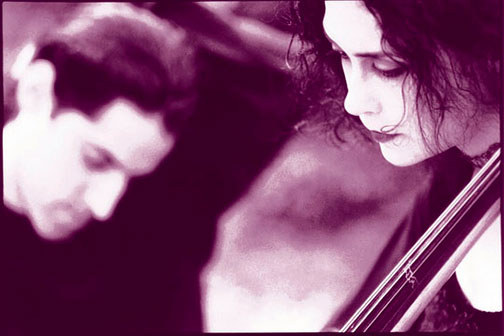
The Writing Disorder: What was it like going on tour and playing live?
Sam Rosenthal: Black Tape never played live for the first ten years. The female vocalists change pretty regularly. When I moved to Chicago, that was the first time we played a show. Patrick of Thanatos worked for Projekt, and in 1996 we came up with the idea of doing a Projekt festival. The first one in Chicago was a two-day at the Vic Theatre; about 1,000 people in attendance. The second year we had about 1,100 people attend, it was massive. That was a great time for music — the mid ’90s. The economy was good, people were still buying a lot of music, and they would come out for shows like that. And then Black Tape started touring in 1998. I think we’ve done around 140 shows now. I have a website for the band that has all that information, so I don’t have to remember any of it! (laughs)
The shows themselves are fun. But the getting around and the waiting and dealing with promoters, that’s not much fun. Touring isn’t high on my list of fun things to do, but there’s no doubt we’ll do it again.
The Writing Disorder: Now that you’re on the west coast, maybe you’ll do some more shows.
Sam Rosenthal: Definitely. We haven’t performed out here since 2004. A decade, wow!
The Writing Disorder: Vinyl records have made a come back. Now you see them sold in bookstores, and even at Whole Foods markets. Is it still expensive to produce vinyl records?
Sam Rosenthal: Yes. Projekt has only done three vinyl releases so far. Two Black Tape for a Blue Girl full-length albums, and one 7-inch release from Love Lies Crushing. Vinyl quality is a lot better today. The only companies that survived were the really good ones. So you see a lot of limited releases of 500 or 1,000 albums. I funded a vinyl release for an older Black Tape for a Blue Girl album through Kickstarter. The enthusiasm is there. And the quality is really good now, for the vinyl and for the covers.
The Writing Disorder: Do you have any musical training? Or are you mostly self-taught?
Sam Rosenthal: I don’t know if it’s self-taught — more like self-done. I’ve had no formal training. Sort of like what I was reading about Brian Eno, and how he says he’s a non-musician. I definitely started like him, just making sounds, I didn’t have any training, whereas my son has had classical guitar training, and he’s really good. I sort of just jammed things together and made sounds. There’s always the question: if you had the proper training would it have restricted you in what you’re doing? I don’t know the answer to that. I think if you have the ability to create music, the training will only help.
The Writing Disorder: So what happened between the 1990s and today as far as your label and the music?
Sam Rosenthal: Projekt got really large in the mid ’90s. At one point I had eleven people working for the company. We were doing the U.S. Mail Order distribution for Hyperium, which was a German label, and Cold Meat Industries, which was a Swedish label. And also Tess, which is out of Santa Barbara, who had the band Trance to the Sun. And all of this stuff was selling really well. There were non-Projekt releases selling over 1000 copies. Even obscure stuff like Gitane Demone did 600 copies!
The turning point was sort of around Columbine, and when Rozz Williams of Christian Death died. They were a year apart 1998/99. It wasn’t because of those things, just that that was the turning point. When people stopped buying music. Napster came along right after that, and things just started changing. By the early 2000s, Projekt was in debt and things weren’t looking great financially; I put out so much music and overspent on promotion and posters and everything. And I had to produce 7,000 CDs back then, and the distributor wanted to give away 600 copies to stores. It’s sort of like bribing stores to take the CDs. But I wasn’t really making money anymore on many of the releases. Projekt had to pull back in and downsize. But it was a smart move, and it worked because we’re still here today. I was downsizing before most companies did it; it took a while to get out of the hole, but I did and Projekt is still putting out music.
The Writing Disorder: A lot of the small, independent records stores went out of business as well.
Sam Rosenthal: The record industry sort of killed the independent record store by giving big discounts to stores like Best Buy and Target. It’s called a co-op, which is basically bribery so the stores will stock new CDs. And stores like Best Buy can sell a CD for cheaper than a smaller store pays for it. This deep discount was used to get people in the door in hopes they’d buy bigger ticket items like a refrigerator or a TV. Small stores couldn’t compete anymore. Borders was doing really well for Projekt, until they started shrinking their music section. They went into debt and committed suicide. Tower Records kept going in and out of bankruptcy. Virgin is gone, there’s nothing left. Amazon is the new music store. I think Amazon, Target and Walmart are the top three records stores in America. And the brick and mortar stores like Target only carry a few titles. So the record industry has to take a lot of blame for the way they did business.
On the other hand, a lot of people have attacked Apple for digitizing music. But the music industry resisted the change, they weren’t jumping in to get their digital sales going. So it took Apple to do that and make it happen, in 2001. The industry itself should have done it years before. Instead of waiting around and suing Napster, they should have had their own digital music stores, but their heads were in the sand (or in their butts). They share a lot of blame for what’s happened as well.
The Writing Disorder: So let’s talk about writing and your new book, Rye. When did you first start writing?
Sam Rosenthal: I began writing lyrics for the band in ‘86. In 1996 I wrote my first book called The First Pain to Linger, a journal-ish kind of writing, somewhat edited. The new book, Rye, was actually written as a book with a developed plot, as apposed to journal-based writing. I’m not sure that I would want to read my first book now.
Rye went through a creative editing process in order to make it a better book. Some of the scenes are exactly the way they were when I first wrote them, and some of them are totally reworked. I have a friend who’s a writer and she edited it.
One of the things with the music and the lyrics is that I work hard to make it seem like I didn’t spend a lot of time fine tuning them. I want my writing to be precise and yet to feel like it’s alive and not overworked. And it’s the same with the book, I think I’ve always been pretty good about finding where the line is, and not pushing it over it into the overworked area. Writing the book was a lot of fun, because it was just me sitting at home and working. With music, I have a lot of other people involved. With music it’s more difficult to move and change certain things, but with writing it’s very easy to change things and move scenes around. My editor said, “Don’t get too hung up on that being the beginning of your book. It might begin somewhere else, another scene might be a better start.” It was a really interesting process for me. When I first submitted it to my editor, she went through it and cut around one third of the book — which was great. I knew it needed it. And through that process I was able to get some new ideas, and figure out how to make it have a great storyline.
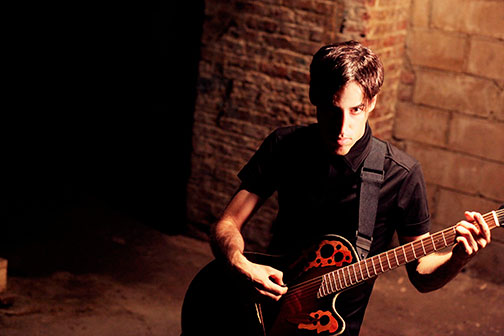
The Writing Disorder: Who were some of your musical influences?
Sam Rosenthal: Soft Cell, Brian Eno, Tangerine Dream, but I also liked Jethro Tull, Alice Cooper and Kraftwerk. The last three probably aren’t as obvious in my music, but the first three are, especially Eno. I also liked This Mortal Coil and Cocteau Twins.
The Writing Disorder: Who were some of your literary influences? Who did you read growing up?
Sam Rosenthal: I don’t think anything I’ve read has had any influence on what I write. With Rye, I wanted to create characters that entertained me, and have them do certain things. The book is erotica, so they have a lot of sex. I once took a class on the history of musical film. And in that class they taught us that in musicals, the musical scene is supposed to forward the narrative of the story. If they just burst into song for no reason, it’s not the same. And so in my book, the sex scenes forward the narrative. Something has to happen within the scene, regarding the characters. It might annoy some people that it’s not traditional erotica because it has a plot and characters and personal growth – these things that would be in a regular novel. I knew the two main characters from the beginning, and then this third character sort of jumped out and wanted to be in the book more. I didn’t have a real structure at the start. I put these characters into scenes and wanted to see what would happen. It was a story I wanted to tell — not that it was influenced by any particular book or writer.
The Writing Disorder: How long did it take to write?
Sam Rosenthal: It took about a year. I wanted to start working on another book immediately, but I ended up moving to Portland, OR, and got sidetracked a bit. I lived in Brooklyn for thirteen years, but I really like it here. It’s definitely different from New York. And the weather has been nice so far.
The Writing Disorder: What do you use to create your music?
Sam Rosenthal: A lot of old equipment. (pause) Most of the equipment is the same stuff I’ve used since about 1988, and a lot of it isn’t working anymore. I have to get it repaired. The last album Black Tape did was a lot harder to produce because it required more precision.
The Writing Disorder: When you’re creating a song, do you begin with keyboards or guitar?
Sam Rosenthal: Depends, I just start making noise. For 10 Neurotics it was the guitar. But most of the albums before that started on the electronics.
The Writing Disorder: So no other literary influences that you can think of.
Sam Rosenthal: One of my other literary influences was Jean Cocteau, and also Franz Kafka. I read a lot of their work. One of my albums has a lot of Kafka themes in it: The Scavenger Bride. I’ve read a lot of biographies. And I’ve been reading a lot of Carlos Castaneda. I found one of his books on the street in Brooklyn, and really dug it. So I started reading the rest of his work.
The Writing Disorder: So you studied graphic design in school?
Sam Rosenthal: No, I studied TV and film. But I ended up getting work as a graphic designer. I learned how to use this presentation software that was pre-PowerPoint; I sort of stumbled my way into that as a way to make money. I would demo the software for people and ended up doing the training as well. I was also one of the people who created visual presentations / shows. A lot of big companies like Taco Bell, Toyota, and Denny’s, would fly me in to create the presentation; they paid me a lot of money to work 24 hours straight for days on end. It was crazy money, and I always had a really good attitude about it, like ‘whatever you want, I’ll change the graphic sixteen times. I don’t care.’ One show would pay me enough to put out another album.
So I didn’t have any musical training or graphic design training, but I had a talent for design and music. And I ended up designing a lot of album covers, which gave me a lot of practice. I still use Quark, and of course Photoshop.
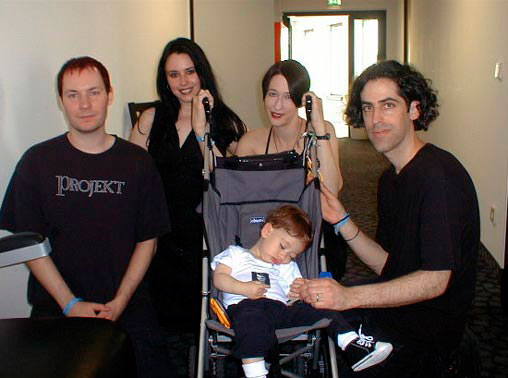
The Writing Disorder: What do you listen to today?
Sam Rosenthal: Steve Roach, Paulina Cassidy — mostly music on my label. For a cross-selection of non-Projekt, I recently listened to Japan, Christian Death, Brian Eno. Also, Sigur Ros, a band from Italy named Spiritual Front, a band from Luxembourg name Rome, and All My Faith Lost, another Italian band. I have a pile of CDs that I bought over the last three or four years that I still have to listen to.
The Writing Disorder: Lycia hadn’t done anything for years, and now they have a new album out?
Sam Rosenthal: Yeah. I think Mike was burnt out on touring and everything and took a break. They did a lot of work in the late ‘90s. There were some health reasons as well. Not having a regular job and having to rely on tour income is tough. So I think he needed to get his health back under control. And he’s still with Tara, they had a kid together. They’re in Arizona. And David Galas, who was in Lycia, he has two of his own records out.
The Writing Disorder: So what plans do you have for the future — more music, more writing?
Sam Rosenthal: Yes, both. I really wanted to start on another book, before my time got devoured by this move to Portland. When I get started, it’s going to be a continuation of the story from Rye. The characters have more things they want to do. And it’s not like I know exactly what that is, I just have to start doing it. There’s a lot of humor in Rye, and it’s a love story as well. It’s about personal development. I want these characters to continue living, because they’re very entertaining to me. It’s different from music because I have a personal connection with these people I’ve created, and they want to do more. With music, even though there are stories, and some that are based in real life, none of it has the same “real people” feel to me as Rye. The albums have characters too, but they only live for a couple of songs. It’s a much bigger process creating people and their lives for a book. I have all these ideas, I just need time to do it.
The Writing Disorder: Have you done a lot of video work?
Sam Rosenthal: I shot two Black Tape for a Blue Girl videos, but I should do more. I’m so busy with work — someone has to run the label. I also have my son to raise, so I’m pretty busy most of the time.
The Writing Disorder: What do you prefer, touring with a band, or a book tour?
Sam Rosenthal: The book tour all the way. You go to different cities, you hang out with your friends, you go eat something and then you go to the bookstore twenty minutes before you have to read something, and you say hi, read from your book, and then you go out afterwards with your friends. It’s great!
Which is nothing like being on tour with a band. I enjoy being with my bandmates, but I have to get to the club early, do a soundcheck, and leave the gear there, and get dressed, and wait around until about 2:00 a.m. to get paid from the promoter — not much fun — unless you like hanging out at clubs and drinking. Touring is a lot of work. There are rewards, but the book tours are a lot more fun, at my level.
Last year I read at a fetish coffee shop in San Francisco where people had to be 18 to get in. It was really cool, I had a lot of fun. Met people, and had experiences I would not have otherwise. Book tours are much better.
The Writing Disorder: Thank you very much for your time. I enjoyed talking with you.
Sam Rosenthal: Thank you for coming by and hangin’ out with me for this.
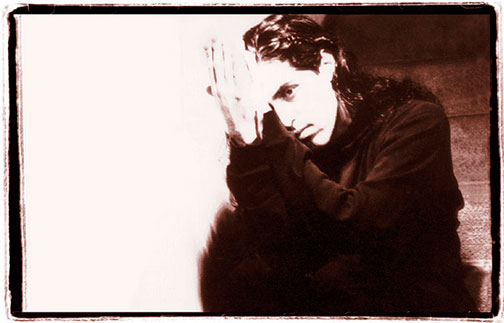
To view the entire Projekt music catalog, go here: Projekt
To follow Black Tape for a Blue Girl on Facebook, visit: Facebook
For details about Sam's book, visit: Rye
ISSUE:
S P R I N G
2014
SUPPORT THE ARTS
DONATE TODAY
GET A FREE T-SHIRT!
By accessing this site, you accept these Terms and Conditions.
Copyright © 2010-2014 TheWritingDisorder.com ™ — All rights reserved